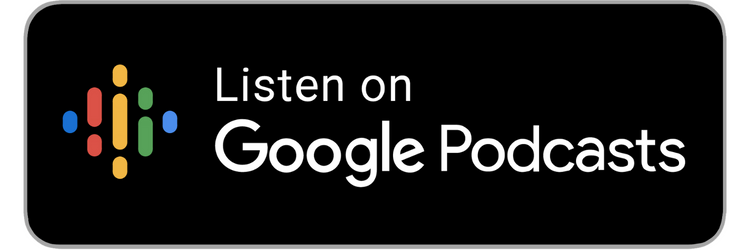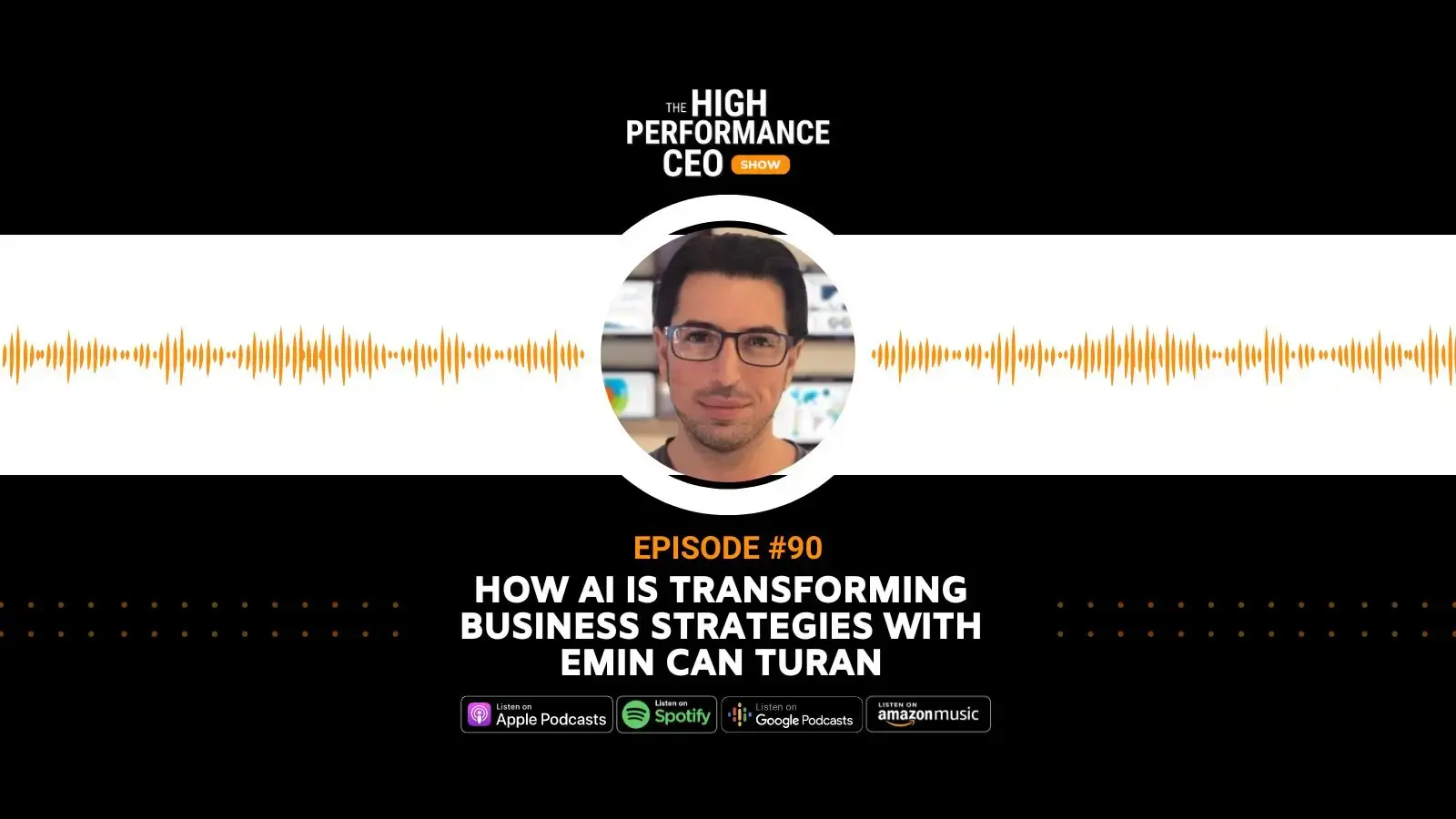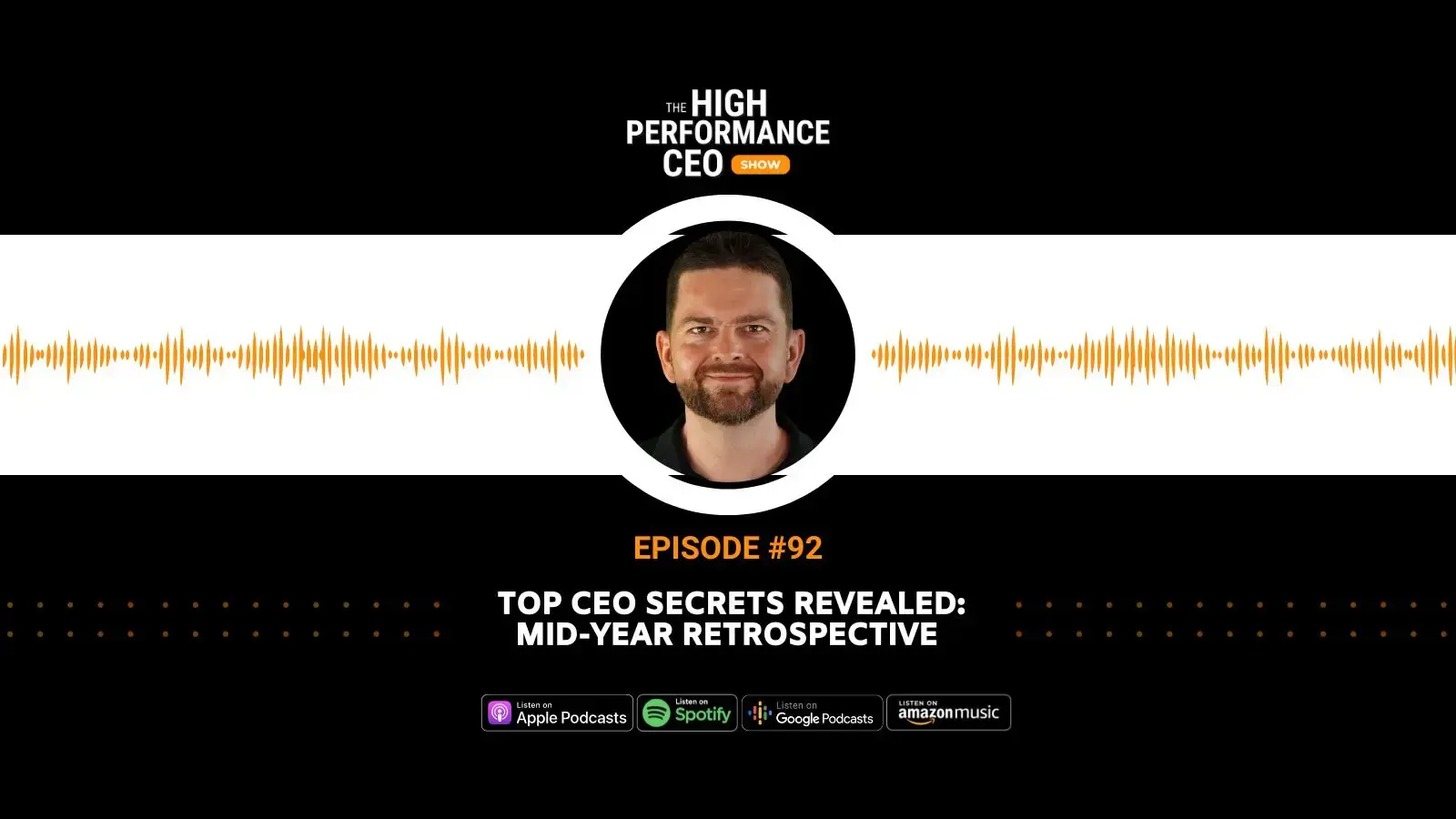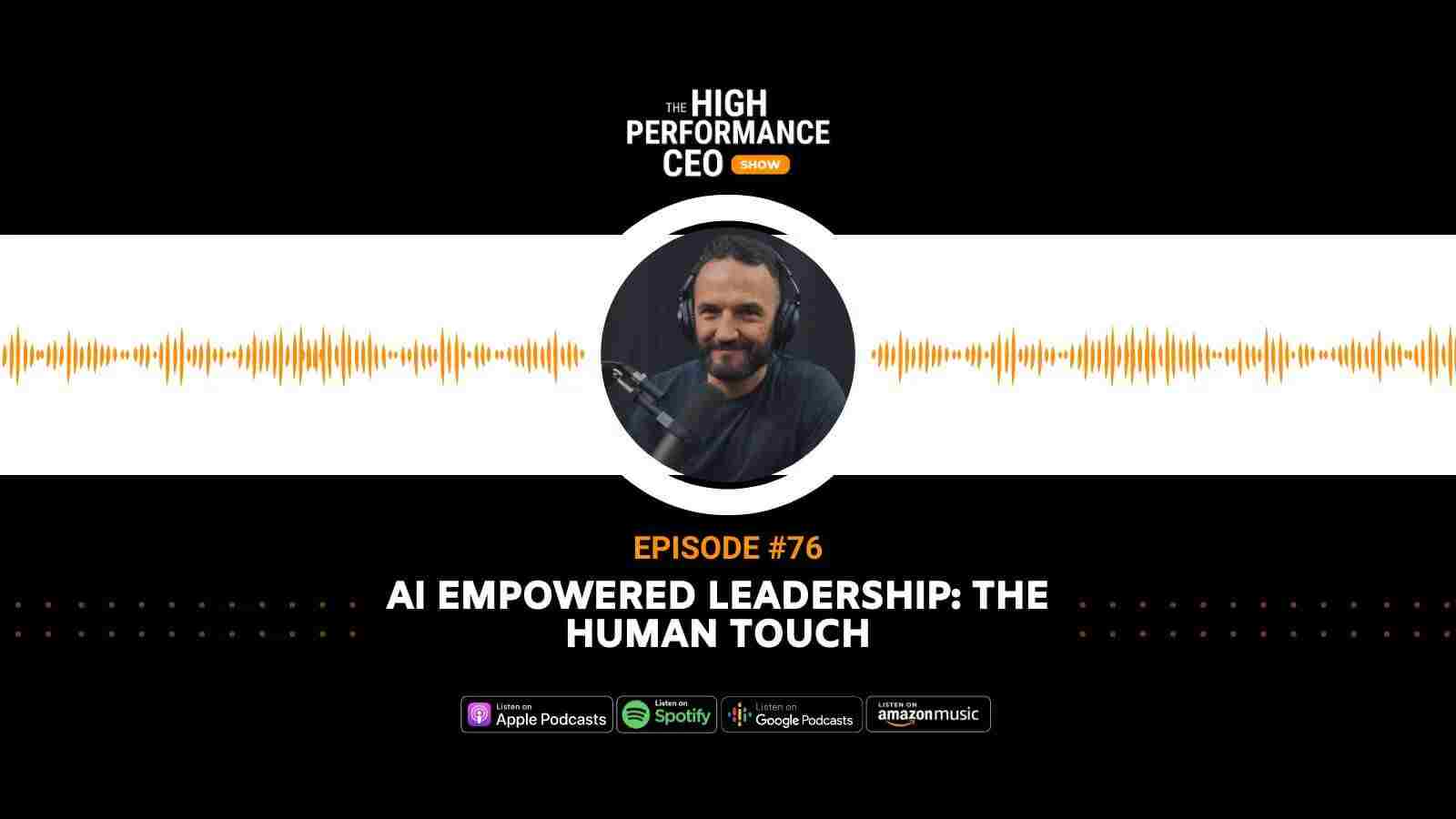26 min read
Fostering Emotional Intelligence in the AI Era: A CEO's Guide
Sebastian Schieke
:
May 3, 2024 1:00:00 PM
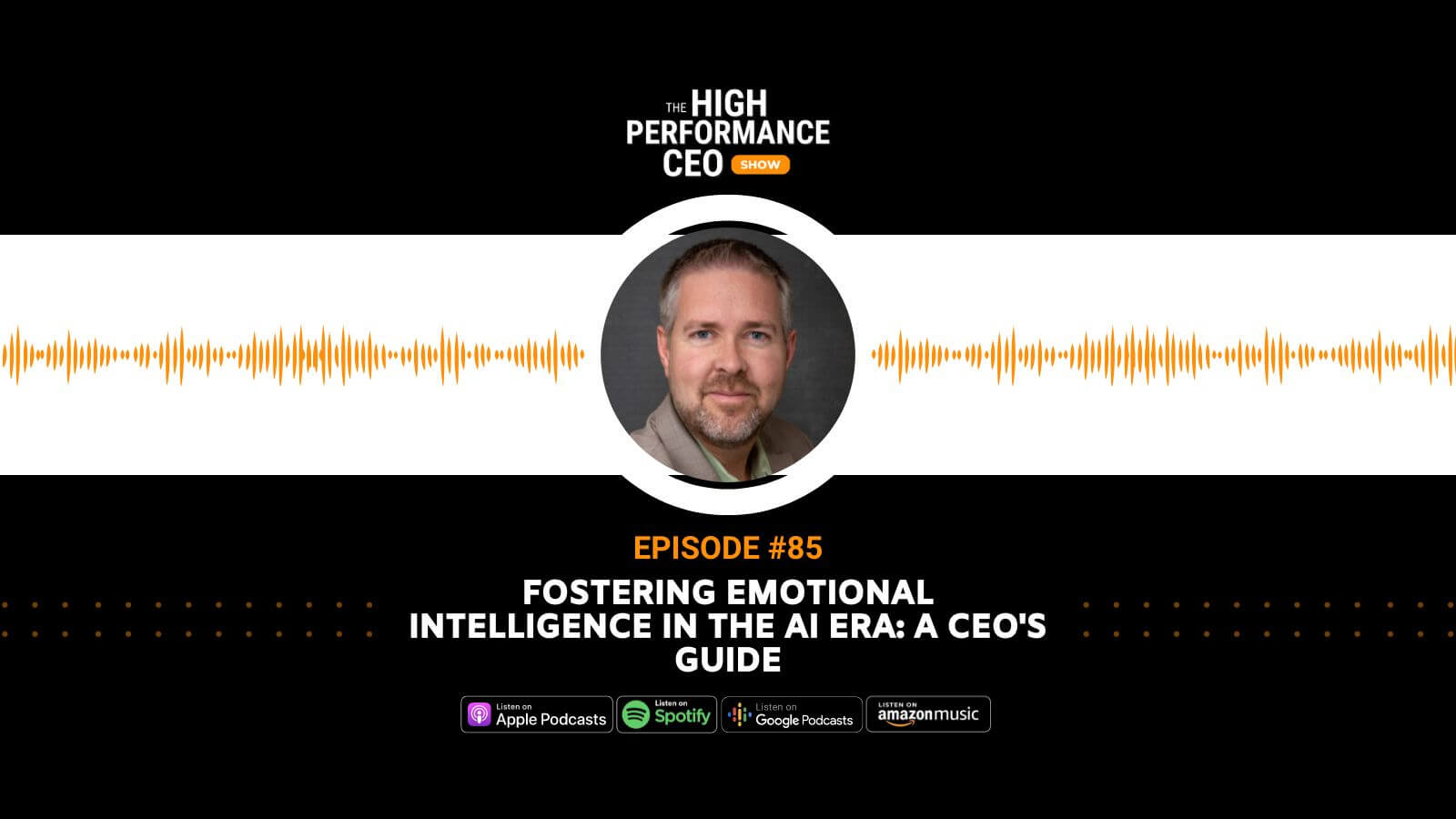
Episode Summary:
This episode shows how AI can help leaders understand and empathize better. It includes insights from Paul AI Allen. It shows clear ways AI tools can improve emotional intelligence in leaders and teams. This leads to a more united and empathetic workplace.
About Paul AI Allen:
- Led the way in using AI to improve understanding and connection between people.
- Known for blending AI with ways to build better leaders and teams.
- A sought-after speaker and advisor on using technology to increase empathy and efficiency at work.
Key Takeaways:
- AI fills gaps in leadership emotional smarts.
- Adding AI will boost how teams work together.
- CEOs looking ahead must grasp AI's role.
Why It's Important for CEOs Like You
This episode is a must for CEOs tackling tech change and keeping their leadership human. It shows how AI can boost emotional smarts and team unity. Paul AI Allen gives real tips for using AI ethically to improve work and strengthen people connections.
What CEOs Can Start Doing
- Check how you're using AI for better emotional intelligence.
- Start talks about how AI can help your leadership and team.
- Look for AI tools that fit your company's culture and goals.
Conclusion
Using AI in leadership and development is crucial for a future with ethical innovation and stronger human connections. This episode, with insights from Paul AI Allen, shows how AI can improve emotional intelligence, team dynamics, and organizational success. CEOs should see how AI can make their leadership better and help create tougher, more connected teams.
Chapters
Introduction to Paul AI Allen (00:01.267 - 00:46.579)
Overview of Paul AI Allen's background in the AI industry and his extensive experience with startups.
Early Career and Foundations in AI (01:14.254 - 03:10.259)
Allen discusses his early programming career and the transition from physical media to online platforms, culminating in the founding of Ancestry.com.
The Evolution of AI Technologies (04:37.838 - 06:02.574)
Discussion on the rapid advancements in AI, including the development of large language models and their impact on business models.
AI's Role in Enhancing Human Well-Being (10:08.334 - 16:24.878)
Exploration of how AI can contribute to various aspects of human well-being, including citizenship, faith, education, and workplace environments.
Strategic AI Implementation in Business (17:53.454 - 23:10.19)
Allen provides insights into strategic considerations for CEOs when implementing AI, including the importance of proprietary data and partnerships.
Future Trends and Ethical Considerations (25:59.502 - 32:41.646)
Discussion on the future of AI, focusing on ethical considerations and the potential for AI to improve interpersonal communications and understanding.
Closing Remarks and Future Outlook (33:37.966 - 37:04.526)
Concluding thoughts on the exciting potential of AI and its implications for future technological and societal developments.
Read the full transcript here
-
Transcript
Sebastian Schieke (00:01.267)
Hey, today I'm talking to Paul AI Allen, not to be confused with the other Paul Allen. So Paul AI Allen, and he's an amazing character. He's a serious entrepreneur in the AI world. He has, I mean, God knows how many AI startups under his belt. And yeah, we will dive into this topic. We will try to see the AI.
world from different perspectives and I'm really looking forward to this. I mean we have this on our books for months this interview and now we made it happen. So Paul, welcome to the show.
Paul Allen (00:41.454)
Thank you, Sebastian, for having me. I'm very excited about who knows what we will talk about.
Sebastian Schieke (00:46.579)
Exactly. I love these kind of open conversations. But maybe when we start, give us a bit of an overview what you do. And as I said, you have founded many AI startups. You are a very well -known figure in this space. And just give a management summary of your most important projects.
Paul Allen (01:14.254)
Well, machine learning or artificial intelligence really starts with data. And I was very lucky in the late eighties, 1980s to start working as a peon programmer for a search engine company called Folio. My brother founded Folio in the 1980s. And for two and a half years, I learned how to data prep lots of content, all the IRS publications in the United States and massive legal collections and even scripture.
and put it on a full text search engine shipped on floppy disk or CD -ROM. So way before the web. And so I learned how to process data, organize data and structure data in a way that would be very helpful for searching. And then I started my first company with my best friend in 1990 and our vision was simple. Let's put all the world's best books on CD -ROM using the Folio search engine. We became a licensor of the Folio search engine. And within a few years,
Sebastian Schieke (01:46.483)
Yeah.
Paul Allen (02:10.318)
We were making millions of dollars selling electronic libraries on CD -ROM. And then in 95, I went to San Francisco and there was an internet developers conference and I, the light bulb turned on. I'm like, wait, CD -ROM is going to disappear. Our whole business model is going to evaporate. We better publish to, we better publish to the internet, not to a distribution media like, like CD -ROM. And then also copyright permissions were really hard. We were in our twenties.
Sebastian Schieke (02:28.691)
You're a gon'.
Paul Allen (02:40.366)
And it was hard to get publishers and authors to take us seriously. Like they're going to license all their electronic publication rights to us. So that was hard. So we thought, well, what is not copyrighted? What if we go get all the public domain content in the world? Well, what about genealogy, birth, marriage, death records? What if all the world's genealogy was put on the internet with a powerful search engine and no copyright permissions were required? And so we started ancestry .com in 1996.
Sebastian Schieke (03:10.259)
You started Ancestry .com. Wow.
Paul Allen (03:10.446)
We incorporate, we, yeah, yeah. We incorporated it in July of 97 and within three years it was on the verge of a billion dollar IPO. So having lived in data for my entire career, it was natural five or 10 years ago to start looking at artificial intelligence, machine learning, and what data sets could my company get access to that maybe aren't part of the open web or the common crawl, what proprietary data sets exist that would allow.
Not just keyword searching, but building of machine learning models and intelligent agents. And so, so because I've lived in the world of data, we're very fortunate. And as you said, I've started several AI companies. We have a roadmap to have 15 AI companies in the next two years coming out of our studio, SOAR AI studio. You can find info about us at soar .com, but in each vertical that we're, that we're pursuing, we have to have deep.
proprietary content that no one else has access to. And what we do, Sebastian, is we partner with some of the world's largest companies in every vertical who have deep content, a large history, but they have no AI in their DNA. They don't know how to do machine learning. So SOAR partners with great companies that are dinosaurs that are going to be disrupted very soon by a pure play AI startup, unless they incorporate the magic of AI into their...
Sebastian Schieke (04:33.971)
Yes, Dave.
Paul Allen (04:37.838)
own company and we do that together through a rev share agreement.
Sebastian Schieke (04:41.651)
Amazing. Yeah, I mean, that's the way to go. Using the content, putting it into an own AI bot, an own large language model, I guess, and then make it accessible to the customers.
Paul Allen (04:55.854)
And in some cases, we don't have to do large language models. We simply do prompt engineering or fine tuning of an existing large language model. So the time to market, I'm telling you four years ago, we started building custom machine learning models for some sales training companies and some leadership companies. And it was really fun. And it took months to go through and mark up all the.
Sebastian Schieke (05:05.011)
Mm.
Sebastian Schieke (05:17.075)
Yeah.
Paul Allen (05:19.214)
Examples that were good and all the examples we would, we have this sophisticated labeling system and we did that for months and months and months. When GPT three came out, we're like, wait a second. We can prompt it and it can answer the question pretty well. When 3 .5 came out, we actually took a project that had taken us three months and $50 ,000 and we replicated it in about 10 minutes with the same level of accuracy. So it literally was a thousand times faster.
Sebastian Schieke (05:33.363)
Yeah.
Sebastian Schieke (05:43.795)
Exactly.
Paul Allen (05:48.27)
to build custom ML models inside of a large language model than it used to be to do the old fashioned human markup process.
Sebastian Schieke (05:57.939)
What amazing time we're living. We just need to find a model to charge for it, you know, because everything is so easy. So easy.
Paul Allen (06:02.574)
You know, I made a huge mistake and I have egg on my face with my team because I've been really lucky in my career, 30 plus year career, to be on the cutting edge of new technology platform waves. So when CD -ROM came out, I was there. When the internet came out, I was there. When Facebook launched, I was an investor in BJ Fogg's company, Yakpac. BJ Fogg is a famous thought leader at Stanford.
Sebastian Schieke (06:12.563)
Mm.
Paul Allen (06:30.766)
And he influenced lots and lots of early Facebook developers. He taught a course at Stanford and by the end of the semester, there were 10 million app users on Facebook from the apps that his students had created in one semester. So, so he's a really smart guy. He invited me to come to the Facebook launch event of his app on Facebook. It was the first F8 conference. And so in May of 2007, I met Mark Zuckerberg, shook his hand, heard him speak about Facebook platform.
And there was only 24 million users of Facebook back then, but he was opening up the platform for third -party developers. So after his speech, I got on the phone with my head of marketing, sorry, my head of my product and head of engineering. And I said, we're not going to build websites for families. We're going to build apps for families on top of the Facebook platform. So we launched an app six months later, got 120 million users. And then of course, Facebook pulled the plug on all the apps and destroyed the Facebook app developer ecosystem. So that was painful.
But I thought when Sam Altman announced the GPT store, that that was another moment in history where we would launch so many GPTs in that store, we would get tens of millions of users. And then I watched what happened. It was delayed a little bit. When it opened up, there were 3 million GPTs and none of them really mattered. So I kind of missed, I thought that history would repeat itself. It did not.
Sebastian Schieke (07:31.411)
Oh yeah.
Paul Allen (07:53.006)
It was like, it's so fast and so easy to build a GPT that anyone can do it. So everyone does it. And none of them really matter because they're not like deeply important or proprietary in any way.
Sebastian Schieke (07:56.115)
Yeah, it's crazy. Yeah.
Sebastian Schieke (08:03.859)
No, it's a crazy world we live in. Yeah. I mean, did you tell Mark that you just deleted his Facebook app from your phone because I read this on your LinkedIn profile.
Paul Allen (08:12.814)
Oh yeah, I deleted it four years ago and I posted on LinkedIn. I said, I've deleted Facebook. I've deleted Instagram. My life in my mental health is way better since I'm not glancing at my phone, you know, 50 times a day. And I had, I think 4 million likes on or 4 million views of that post. And Forbes magazine reached out to me and says, we want to interview you for an article because like deleting social media, you guys, social media is designed to be addictive.
Sebastian Schieke (08:22.259)
Exactly. Yeah.
Sebastian Schieke (08:31.827)
Makes so much sense.
Paul Allen (08:41.838)
to sell your time and attention to the highest bidder and they do not have your wellbeing in mind. And so there's a fundamental flaw in how the social media world operates. Now, this isn't a side, but I'm going to Boston this week to give a lightning talk at an MIT event. There's a project called Project Liberty that is coming out very soon. It's being funded by the former owner of the Los Angeles Dodgers. He's putting $500 million.
Sebastian Schieke (08:45.139)
Exactly.
Paul Allen (09:11.054)
towards creating a brand new version of the internet with a new protocol for decentralized social media protocol, DSMP. It would allow a new version of Google, Facebook, and every other major tech company to launch that doesn't give them control of your identity and all your data. It's like the pendulum might be swinging backwards towards a very kind and gentle internet that is...
treats you with respect and dignity and doesn't just hoover up and suck up and buy all the data they can about you and then target you with their algorithms. So I'm actually very hopeful. I'm one of hundreds of people that will be at this event and it's the beginning of another launch. And this time I hope I'm right that the Project Liberty and the DSMP protocol might usher in a new good era in human interaction with the internet instead of us being targeted and productized.
Sebastian Schieke (10:06.355)
Yeah.
Paul Allen (10:08.334)
that we can use it for what it was designed to do, which is good knowledge, sharing connection, not exploitation of us.
Sebastian Schieke (10:11.379)
Initially, yeah. Yeah.
Sebastian Schieke (10:17.043)
I love this. I mean, I need to check this out. It's a very interesting idea.
Paul Allen (10:23.918)
I recommend that people go to YouTube and search for Frank McCourt and Project Liberty. And you'll find a whole bunch of videos on CNBC. He's been talking about this for four years, but in the last few months, he's been describing Project Liberty and the decentralized social media protocol. And there's now about a million people that have signed up for the DSMP. What we really need is tens of millions or hundreds of millions of people saying, I'm going to choose to only launch.
Sebastian Schieke (10:31.059)
Mm -hmm.
Sebastian Schieke (10:43.635)
Mm -hmm.
Paul Allen (10:51.342)
apps and websites that are on the DSMP because now I'm in charge. I get to use the internet how I want to rather than being used by it, being exploited by it and by the trillion dollar companies that own all of our data. So I'm excited and I hope this is the ushering in of a, of a new better era for humans on the internet.
Sebastian Schieke (11:11.987)
Amazing, amazing. So I mean, looking at all these different AI topics, where do you see this whole thing? I mean, there are so many different opinions out there. We talk about AGI that in five years, it will be available. And I mean, there's so much happening. What is your view on this industry? Where is this developing to? And.
where can businesses also make money because everything seems to be for free, you know?
Paul Allen (11:44.046)
Well, I think those are really good questions. And I will admit that I am not a deep researcher or inventor of core technologies. I've always been what I call a platform entrepreneur. I find who has created a platform that will be spreading widely and how can I play on top of that platform in that ecosystem? So I'm applying technology, not inventing it from scratch. There are brilliant people that are doing hardware and software and inventing things. And I'm...
I'm finding what's invented that is going to spread everywhere. And then how can I play a role in that space? The way I look at, I mean, I don't believe AGI will be sentiment, sentient and thinking and conscious. I just don't, it's just bits and bytes. It's a machine. I think humans, I believe humans have a spirit or a soul and that we are the greatest creation in the universe. And I don't believe in just random chance. And I believe there's a...
you know, a divine creator. So as a person of faith, I believe that humans are the greatest of all creations were kind of the penultimate and that tools and machines are supposed to be doing work for us under our control. Now there are going to be autonomous machines and holy cow, the horror of autonomous warfare with drones and robots and
Sebastian Schieke (13:04.723)
which is happening, yeah, it's happening, yeah.
Paul Allen (13:04.782)
massive weapons. It's happening. It's happening. It's very scary. And the you, the world needs to unite around that and ban that and regulate it. Like we did chemical weapons after world war one. It's just horrific. What could the scenarios are real and it's going to be human's choice, whether we go down that path or not. And I think collective action is going to be required. But the way I view AI or machine learning is rather simple. It's like,
Sebastian Schieke (13:19.667)
Hmm.
Paul Allen (13:32.526)
studying what leads to human happiness. Okay. The United Nations just published their UN happiness index. Well, who did all the surveys and research to decide of all the countries in the world, which populations are the happiest, which ones have the highest wellbeing? Well, it's Gallup in Washington, DC. Gallup invented statistical sample polling in the 1930s. Dr. George Gallup invented that. And now political science is filled with
Sebastian Schieke (13:37.779)
Mm.
Sebastian Schieke (13:51.827)
Hmm.
Paul Allen (14:01.582)
You know, rigorous methodologies for population sampling and reporting public opinion. And that, that methodology has been used by all other companies. Well, Gallup has been an independent company for 80 plus years, and they want to study human wellbeing all around the world every year. And then they want to report back to leaders of countries and leaders of corporations, leaders in education, leaders in faith, how suffering.
or struggling or thriving the population is. And so what I think is interesting in the world of AI, where there is a potential future where AI and robots create a lot of value and that there's enough food for everyone, enough housing, enough energy, there is a potential scenario of abundance. But for your individual experience through life, what for you, Sebastian, constitutes a life well lived where you feel...
Sebastian Schieke (14:48.147)
Mm -hmm.
Paul Allen (14:58.382)
flourishing and thriving. You feel happiness, you feel joy. Well, Gallup has been studying happiness for decades. Gallup has published a book called Wellbeing and they've broken down human well -being into five categories. Your financial well -being is important because if you're stressed financially, if you can't feed yourself, then there's not a lot of joy in that. Your physical health and mental health, just your physical well -being is very important. Health matters, but social well -being,
Sebastian Schieke (15:27.987)
Hmm.
Paul Allen (15:28.014)
community wellbeing and career or purpose wellbeing. Also, all five of those things matter. We've taken those five elements of wellbeing and we've broken them into 20 different categories. And the vision of the SOAR AI Studio is to take all 20 elements that will lead humans to flourish and thrive and to figure out how can AI and great content in that sector help you become
Sebastian Schieke (15:51.795)
Help them, yeah.
Paul Allen (15:56.462)
and the best you can be. So for example, we launched citizenportal .ai because freedom and liberty and self sovereignty is an important part of human flourishing. If you live in a dictatorial state, a totalitarian state, you're never going to thrive. You really need autonomy and agency and choice. So freedom matters and being an active citizen and informed active citizen matters eventually to the wellbeing of individuals and communities and whole nations. So citizenportal .ai.
Sebastian Schieke (15:58.099)
Hmm.
Sebastian Schieke (16:06.771)
Yeah.
Paul Allen (16:24.878)
is an attempt to take every government meeting in the United States, every public meeting, transcribe it with AI, and then build a retrieval augmented generation and a GPT so that citizens can know what their elected officials are doing and saying on every topic. Citizen portals being followed by faith portal. So the 70 plus percent of the world's population that believe in God or that attend a particular religious faith, they go pick the teacher or pastor, priest or rabbi or imam,
who they want to learn from. And right now you go weekly and you probably take a few notes and then you forget 99 % of what your leader taught you. Faith Portal will archive the teachings of all of your chosen leaders, your local pastor or priest, and it will build a GPT or a Retrieval Augmented Generation on top of their teachings. So while you're driving in the car, you can say, what did Pastor Duke say about anger and forgiveness? And it will quote him quoting scripture. So,
It's personalized, it's hyper local, and it knows who your favorite religious teachers are. Well, what if we do that for education too, so that every course you take in college is recorded, transcribed, indexed, and is available to you for the rest of your life. You could have perfect recall of what your favorite teachers taught you throughout your life. And then we do that for workplace. We do that for sales, leadership, coaching. And so health and finance and legal are down the, are on the roadmap for us, but.
Sebastian Schieke (17:26.611)
Hmm.
Sebastian Schieke (17:33.875)
Exactly.
Paul Allen (17:53.454)
Really the goal of Sore AI Studio is look, humanity is witnessing the emergence of the greatest technologies that have ever been birthed in human history. And we can harness them for good. Let's do that together. Or we can harness them in greedy ways or in controlling ways. And I think if enough people choose the path forward, which is humans should be in control of these tools, individuals,
should have personalized AI that guides you and uplifts you throughout your life and helps you reach that level of thriving in every area of your life. And if it notices that you're falling short in some area, if you're lonely, if you're unhappy at work, then it can guide you to a better job or to a better manager or to closer friendships. Yeah.
Sebastian Schieke (18:27.955)
Hmm. Yeah.
Sebastian Schieke (18:38.291)
Exactly. Coach you, yeah. Have your personal coaches help you in these areas. I love this vision. I mean, I was on a conference a couple of weeks ago and there was a Finnish group and they said, yeah. I mean, I haven't seen the latest Gallup study, but I think Finland is one of the countries with the highest satisfaction and happiness. And this guy said, yeah.
We love adopting new technology because we love our work -life balance. Because using this AI helps us in our work -life balance. We don't need to focus on these mundane tasks. We can automate things. We can optimize processes. And this makes us happier. And this is where it comes together, leveraging AI, reducing stress, reducing mundane activities. And.
ultimately will increase your happiness and will help you rank your country on your Gallup study.
Paul Allen (19:37.39)
Yeah, I have a neighbor who's just going to Lithuania and according to the latest Gallup study, Lithuanians under the age of 30 are the happiest people on earth. So I'm really curious what we should do as humans and Dr. Don Clifton, who invented the StrengthsFinder assessment and who was at Gallup for many years. Don said that to be successful, you should study success.
Sebastian Schieke (19:41.971)
Mm -hmm.
Sebastian Schieke (20:02.643)
Mm.
Paul Allen (20:03.182)
So one of the things that humans can do with the help of AI is find the models of success in every area of life. Who's living a healthy life? Who has a happy marriage? And model that. The AI can help us understand the actions, the behaviors, the thoughts, the things that happen and don't happen in a successful model. In a country, what is it about Finland in their education system? I know they value teachers. Almost all teachers have master's degree. They let children play.
Sebastian Schieke (20:24.883)
Mm.
Yeah.
Paul Allen (20:31.438)
There's a lot of things that I've been reading about Finland. And now you're telling me that they have a healthy view of technology, helping them live happier, healthier lives with a better work -life balance. I love that. So the opportunity for all of us is to study and find successful models in all the areas of life that we want to be successful in, and then to use those models as guides to our own journey through life. And AI can help us.
Sebastian Schieke (20:55.443)
Exactly.
Paul Allen (21:00.43)
live up to that model. Here's an example. You know, Stephen M. R. Covey is a wonderful author and teacher. He's written a book. His father, Stephen Covey, wrote Seven Habits, which sold 70 million copies or something. And his...
Sebastian Schieke (21:09.843)
The seven habits, exactly. And the other guy wrote the seven habits for young people, for teenagers. I bought this for my son.
Paul Allen (21:17.294)
Yeah. Yeah. Oh, excellent. Yes. And he has several children that have also become authors. Well, Stephen M. R. Covey is, is one of his sons. He's written two books on trust. One is called the speed of trust. And I have a signed copy of that. Stephen and I have been friends for years. And then his latest book, trust and inspire. Well, there's the old fashioned model of leadership, which is command and control. It's like the military or, or, uh,
Sebastian Schieke (21:22.931)
Yeah.
Sebastian Schieke (21:42.867)
Yeah.
Paul Allen (21:46.99)
kind of top down, I'm in charge, I pay you to do what I tell you to do, okay? That's not the kind of leadership culture that most people in today's world want to live in. We want a leader that trusts and inspires and builds a culture of inclusion and also, you know, we get to be our best selves and bring our whole selves to work. And so, Stephen has teamed up with our company and we've now built an AI model that...
will watch how a leader interacts with their team members after every meeting and call. And it grades them on the scale of command and control tendencies versus trust and inspire tendencies. And Steven says only 8 % of leaders in the modern world are pure trust and inspire leaders. 30 % are still using the old command and control model and 62 % are somewhere in the middle. Well, with AI feedback, Sebastian,
Sebastian Schieke (22:24.947)
Uh -huh.
Sebastian Schieke (22:41.299)
Exactly.
Paul Allen (22:41.71)
If you got training from Steven M. R. Covey and his staff, if you went to read his books and study the material and listen to their examples, and then you start to practice it every day, you get feedback after every meeting within days or weeks, you could reach that a hundred percent. I'm a trusted inspire leader all the time, instead of guessing or wondering, you now have AI that can detect the tendencies and score you and grade you. So.
Sebastian Schieke (22:44.339)
Yeah.
Sebastian Schieke (23:02.931)
Yeah.
Paul Allen (23:10.19)
Just like athletes get to watch game film every week, now knowledge workers who aspire to follow any successful model will have feedback in game film after every call or meeting. And I believe humans will accelerate their development faster than ever before.
Sebastian Schieke (23:14.003)
Yeah, you just exactly.
Sebastian Schieke (23:27.827)
That's so easy. I mean, we all are on Zoom and Teams, you know, you just put this into a Zoom, record a Zoom meeting, transcribe it, send it to a new model, and then you get feedback.
Paul Allen (23:37.838)
Yeah. I've been trying to think of examples in human history where somebody created a new model and then everyone had to follow that model in order to be successful. So if you're following track and field, you know, decades ago, there was a high jumper. And in the old days, high jumpers were doing like a scissor kick. They would like, they would like run and jump and kind of scissor their way over the thing. And then this guy, Dick Fosbury came up with something that.
Sebastian Schieke (24:00.435)
Hmm?
Paul Allen (24:06.958)
seemed ridiculous. It was called the Fosbury flop and literally he could jump inches higher than any other jumper in history. And now every high jumper in the world uses the Fosbury method. Okay. Now think about this salespeople, teachers, uh, coaches, nurses, doctors. What if there's a model out there? What if there's a model or a protocol that if you follow it carefully, your success will be so much greater than it is today on your own.
with kind of a just however you show up, you show up. When we can study and apply models to ourselves, there is no limit to how much we can progress. Now there is something important in this. We're not all blank pieces of paper that anything can be written on. We actually have different biological and neurological systems. Your brain neurological pathways are wired differently than mine. So the goal of the SOAR AI platform,
Sebastian Schieke (25:01.939)
Mm.
Paul Allen (25:04.59)
is to use something we call prism AI to take the world's knowledge advice and the best models in the world and run it through a prism that is personalizing the recommendations to inspire subject mastery based on your talents, based on your neurological pathways. So if your brain is a computer and you have a CPU in your head and I have a CPU in my head and I speak advice to you or I show you a model, okay.
And it works perfectly for me. I've been successful because I did this, this, and this Sebastian. If you do this, this, and this, you'll be successful too. That instruction set comes out my mouth, goes into your ear. Now it's in your CPU and it doesn't process for you the same way it processes for me. You have a different set of talents. So what we have to do is adapt that model to play to your strengths. So then it's like, Oh, okay. Now this is a Sebastian version of the model.
Sebastian Schieke (25:46.291)
Exactly. Yeah.
Sebastian Schieke (25:54.643)
Hmm.
Paul Allen (25:59.502)
and it plays to your strengths and it'll be easy for you to do that and to have the successful outcomes that I had, but in a different way.
Sebastian Schieke (26:06.259)
That's awesome, because it really solves the problem that, I mean, often you have these coaches and trainers, they sell their model of success and to hundreds of people. But when you see the success rate of their coaching, it's actually very small, because not only a small fraction, and I've seen numbers from coaching programs, I know exactly that it's in the one digit frame, you know, the success rate of some of the coaching.
And I just ask myself, hey, why is that? But this exactly explains it. We have a different wiring, a different operating system, and we have to adapt and change the teaching to meet our system. And.
Paul Allen (26:51.854)
I've been, I've been developing for seven years, something I call the advice resonance theory, ART. And that is that 90 % of the advice you get is wrong for you. It's right for the person giving the advice because they want to share their successful path with you. And I think this applies to models too. 90 % of the models you see won't work for you. But the cool thing is if you can find the 10 % of advice or the 10 % of models that will work for you, because the people who did it that way.
Sebastian Schieke (27:00.339)
Mm. Mm.
Oh.
Sebastian Schieke (27:16.531)
That works.
Paul Allen (27:21.422)
are wired like you, then you pick that success model, it works for you, and then you can then share your successes with others. And so I just think it's so cool. Humanity is so diverse. We have different talents, we have different strengths, we have different gifts, and we all have different weaknesses. And so you have to take knowledge and advice and models and fit it to the person receiving it so that they can optimize their outcomes.
Sebastian Schieke (27:47.891)
How do we identify our way of thinking, our way of firing? I mean, do we need a Neuralink for that or?
Paul Allen (27:55.342)
You know, someday I think we'll probably do an fMRI scan and it will tell us what our greatest talents are. Now today there's a very popular talent assessment or strength assessment and it's spread around the world in many, many countries, but it was started in 1999 in Gallup. They call it StrengthsFinder. Now they've changed the name to Clifton Strengths because Dr. Don Clifton invented it. And it's been taken by 32 million people, Sebastian.
Sebastian Schieke (28:00.083)
Yeah.
Sebastian Schieke (28:06.483)
Mm -hmm.
Sebastian Schieke (28:15.827)
Mm -hmm.
Sebastian Schieke (28:23.539)
Mm.
Paul Allen (28:24.27)
So for example, every employee at Accenture takes CliftonStrengths to discover their top patterns of thinking, feeling, and behaving. And I actually think that the StrengthsFinder CliftonStrengths assessment is the best way in the world today for any of us to discover our most common patterns of thinking, feeling, and behaving. And we hope that AI someday will know your strengths and customize advice, tasks, feedback.
Sebastian Schieke (28:44.051)
Mm.
Paul Allen (28:53.902)
to your strengths so that it is easy for you to understand, receive and apply. And I really think that that combination of AI being a super intelligence that knows everything and also being a hyper local intelligence that knows who you are and what makes you tick and also gives you complete control over what your values and goals are. You are in charge and it understands all the possible paths forward. It understands.
what would be easy for you to succeed at. And then when you tell it what your goals are and what you want to achieve, it enables you to do that. I think AI needs to respect your human agency and not try to override you or say, no, you can't do that. Or, you know, you know, it can't be politically correct. It can't be trying to like coach you in what's a culturally acceptable thing. It's like, no, no, AI should be my tool to help me achieve my.
Sebastian Schieke (29:41.811)
No.
Paul Allen (29:51.95)
goals and values, whether they're religious or not, spiritual or not. Um, but they, you know, I'm not saying you should enable AI to do bad things, uh, but whose definition of bad and, and like, I, I'm just, I'm, I'm worried about government overreach and corporate overreach. So I'm excited about open source. I'm excited about good people who want to design systems that are respectful of human agency.
Sebastian Schieke (30:11.315)
Hmm.
Paul Allen (30:21.934)
and human time and attention. And we're not trying to control you or your time or your money or get you to buy what we want you to buy. Like that's what we've been living through for 20 years. The technology world is in charge of information and commerce and everything. Like it's really extraordinary how much control a few trillion dollar companies have on what the world thinks and sees and does. But I think it can shift. I think it can pendulum swing back to,
Sebastian Schieke (30:32.691)
Oh yeah.
Paul Allen (30:51.758)
a much more participatory, collective, democratized way of letting technology into our lives.
Sebastian Schieke (30:54.835)
democratized way, well, yeah. I love this strength find. I mean, I used to, I built a GPT and uploaded my disk and motivator profile, and then I start chatting with it, and then I ask questions, you know, when sometimes you have an interaction with someone else and you don't really know how to react to certain personality, but when this GPT knows you inside out and maybe even knows the personality of this person,
because you can run this in a team. You can run a team assessment of all your employees and put it in a GPT. And then you can have a conversation and say, ah, you know, I had a talk with Paul and this came out. I'm like this and Paul is like that. So what is the best way to communicate? And these amazing tools. Yeah.
Paul Allen (31:43.758)
I am so glad you did that. That's actually really cool that you did your disc profile and GPT. And we've built that, we've built that email composer tool already that can fine tune any message to any disc profile. We're going to add any a gram. We'll certainly if Gallup lets us, we'll add the Clifton strengths assessment too. But I think communication gaps are one of the biggest reasons why there's conflict in today's world. You try to say something, they don't receive it. And it's because you don't think the same way.
Sebastian Schieke (31:52.627)
Uh -huh.
Sebastian Schieke (32:07.059)
Yes.
Paul Allen (32:12.494)
But if you understand how they think, and just like you said, fine tune the message, it's not changing the message. It's just fine tuning. It's the same content, but given in different words so that they can receive it and they're not rejecting it. They're now receiving it. Now they understand. Now you understand each other. If that could happen at scale where humans could stop miscommunicating and misunderstanding one another, can you imagine the harmony that could be generated around the world?
Sebastian Schieke (32:16.051)
Hmm. No. No.
Sebastian Schieke (32:38.003)
Yeah.
Paul Allen (32:41.646)
If we actually speak in each other's languages in ways that people understand, I'm so excited about what AI will enable. I mean, foreign languages is one thing with Meta's open sourcing of a 1000 language model. And you could travel almost anywhere in the world. In a few years, it'll be all 7 ,000 languages. You'll literally be able to communicate with any other human in any language in real time with this AI. Now take that to personality types. And now you're like same language that.
Sebastian Schieke (32:49.107)
Yeah.
Sebastian Schieke (33:00.179)
Mm.
Paul Allen (33:11.182)
both of you understand, but also in a tone or in a format that their personality will receive it. And then the barriers that divide us, the communication, the misunderstandings could be obliterated by AI, by us being assisted to communicate and connect on a more deep level than has ever been possible before.
Sebastian Schieke (33:26.259)
Hmm.
Sebastian Schieke (33:34.099)
What an abandoned and amazing world we're creating. Yes. Definitely, definitely. I could discuss this for hours. It's such an interesting topic. And there's every week something else coming up and new developments. And you see, it's really hard to keep up, but it's the most amazing time I'm around.
Paul Allen (33:37.966)
Isn't it exciting? It's so cool to be alive right now.
Paul Allen (34:02.734)
Totally agree. It is impossible to keep up, but we don't have to keep up 100%. We just need to catch the few nuggets that will help us keep going faster than before. And pretty soon the acceleration of all of our journeys towards flourishing will be amazing. I'm just very optimistic.
Sebastian Schieke (34:03.667)
Yeah.
Sebastian Schieke (34:20.723)
Yeah, no, I mean, thank you so much. I mean, this was a fountain of ideas and great concepts. And I'll need to check out Strengthfinder as an addition to my portfolio of assessments.
Paul Allen (34:37.678)
It's, it's my favorite by far. And, uh, I hope someday John Clifton, the CEO of Gallup wants it to reach a billion people someday. And I really hope that happens. I hope a billion people know what their Clifton strengths are in the coming years and can use them bait day by day. And, and they're, you should know your family members Clifton strengths. You should know your friends Clifton strengths, your colleagues, your coworkers, because when you understand how the other people think, act and feel in positive ways, these are all, these are all talents and strengths.
Sebastian Schieke (34:39.315)
Yeah.
Sebastian Schieke (34:49.779)
Yeah.
Paul Allen (35:07.79)
They're not just personality traits like introversion or extroversion. It's like, okay, this is all 34 strengths that are all needed. They bring something, they're valuable. And so if you know someone's top five strengths, you see the value that they bring that no one else in the team brings. And so it's a very beautiful, positive lens through which to look at other people. It's all about their gifts and strengths. It's not about what's wrong with them. It's not how they're different. It's their strengths. It's the contributions they can make.
So just viewing people through the lens of what is right with this person, what do they have to contribute? It changes how you see other people.
Sebastian Schieke (35:37.779)
Hmm.
Sebastian Schieke (35:47.379)
Maybe start with your spouse, you know?
Paul Allen (35:49.998)
100%, yo, my wife and I have like totally different top fives and her top five is about my bottom five and her bottom five is my top five and it really helped us. We did a few years of therapy in 2006 to 2010 and that helped us a lot, but having the positive language of strengths has helped her really appreciate things that she didn't appreciate about me before and vice versa. So yes, I totally recommend people.
Do this with your spouse or your partner and learn to see the best in them through the lens of one of the world's best psychologists. It's a really cool journey.
Sebastian Schieke (36:29.203)
Amazing. Hey, thank you so much, Paul AI. I could talk for you with you for hours. We definitely have to do this again. We take all these learnings now and we will put in a show note your contact details so people can find you. And hey, continue creating amazing things for humanity.
Paul Allen (36:32.75)
You're welcome.
Paul Allen (36:37.678)
Well, we'll have to do it again sometime Sebastian.
Sebastian Schieke (36:59.411)
I will definitely follow your work and thanks a lot for your time today.
Paul Allen (37:04.526)
Thanks, Sebastian.
